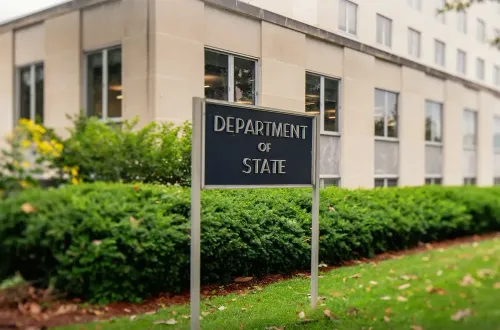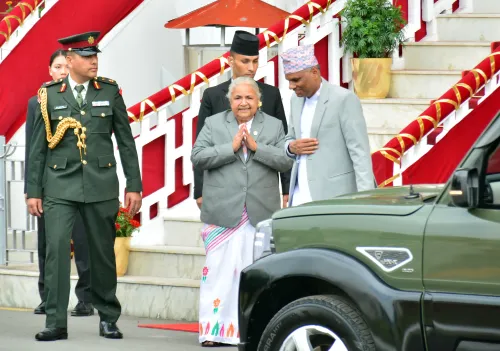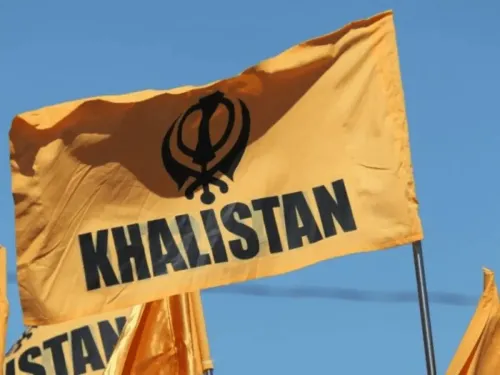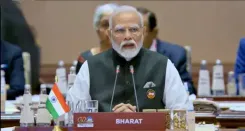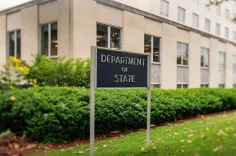Why is France Concerned After US Strikes on Iran's Nuclear Sites?
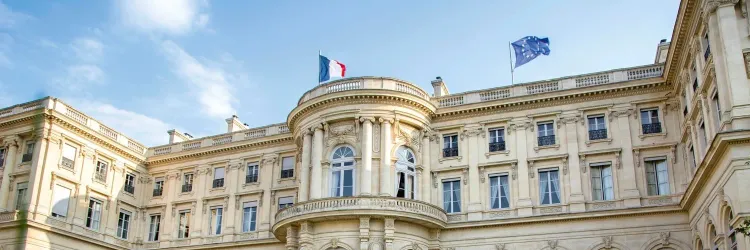
Synopsis
Key Takeaways
- France expresses concerns over US air strikes on Iranian nuclear sites.
- Call for restraint among US, Iran, and Israel to prevent escalation.
- France opposes Iran's nuclear ambitions and advocates for diplomatic negotiations.
- The IAEA reports no elevated radiation levels post-strikes.
- Emergency meetings among world leaders are being convened to address the situation.
Paris, June 22 (NationPress) France raised alarms on Sunday following the U.S. air strikes on three nuclear facilities in Iran, stating that it had not participated in or planned these military actions.
The French government urged the United States, Iran, and Israel to exercise caution to prevent any further escalation that might exacerbate the ongoing conflict in the Middle East, as stated by the Ministry of Europe and Foreign Affairs.
Amid the escalating Iran-Israel conflict, the Ministry emphasized its priority of ensuring the safety of French diplomats and citizens, along with safeguarding France's interests and allies in the region.
Furthermore, the Ministry reiterated France's strong opposition to Iran obtaining nuclear weapons, underscoring that a sustainable resolution to this conflict necessitates negotiations within the framework of the Non-Proliferation Treaty.
France is prepared to assist in this endeavor alongside its allies, as emphasized in their statement.
The Ministry acknowledged the International Atomic Energy Agency (IAEA)'s report, which indicated that no elevated radiation levels have been detected following the U.S. strikes on the nuclear sites in Iran.
An emergency defense Cabinet meeting is scheduled for Sunday to deliberate on the recent developments in the Middle East after the U.S. launched air strikes against Iran, as per the French presidency.
French President Emmanuel Macron has engaged in discussions with multiple world leaders, including the Saudi Crown Prince Mohammed bin Salman, regarding this matter and will continue talks with European and regional leaders.
Earlier, U.S. President Donald Trump announced that America had targeted three nuclear sites in Iran, cautioning Tehran of further precision airstrikes unless it ceases its confrontational stance against Israel.
The targeted sites reportedly include the heavily fortified Fordow, Natanz, and Esfahan nuclear facilities.
In a media briefing shortly after the strikes on Saturday (U.S. time), Trump stated, "This cannot continue. There will either be peace or tragedy for Iran, far greater than what we have witnessed over the last eight days. There are many targets left."
"Remember, there are many targets left. Tonight was the most challenging of them all, by far, and possibly the most lethal, but if peace does not come swiftly, we will pursue those other targets with precision, speed, and skill," he continued.
The President insisted that the strikes were aimed at debilitating Iran's nuclear enrichment capacity and halting the nuclear threat posed by the world's foremost state sponsor of terror.
Despite extensive diplomatic efforts to renegotiate a nuclear deal with Tehran following the U.S. withdrawal from the 2015 agreement in 2018, Trump has now fully endorsed Israel's military campaign against Iran's nuclear infrastructure and senior military officials, a campaign that commenced just over a week ago.
In his statement, Trump expressed gratitude to Israeli Prime Minister Benjamin Netanyahu, saying, "I want to thank and congratulate Prime Minister Bibi Netanyahu. We worked as a team, like perhaps no team has ever worked before, and we've made significant progress in eliminating this dire threat to Israel. I appreciate the Israeli military for their excellent work."
The air conflict between the two nations intensified on June 13 when Israel executed a surprise strike on Iran.
Israeli officials claimed the offensive was a preemptive action to prevent Tehran from attaining nuclear weapons, a goal Iran has consistently denied.
This conflict has heightened tensions across the region, already strained due to Israel's prolonged war in Gaza since October 2023.
The recent exchanges have now directly engaged the United States in military action.
Earlier in the day, Trump shared on his social media platform, Truth Social, labeling the strikes a "historic moment for the United States of America, Israel, and the World… Iran must now agree to end this war. Thank you!"
In another post, the U.S. President commended American forces, stating, "There is not another military in the World that could have accomplished this. Now is the time for peace! Thank you for your attention to this matter."
Iranian state media confirmed damage to parts of the Fordow nuclear facility in what it termed "enemy strikes," although additional details regarding the extent of the damage remain sparse.


